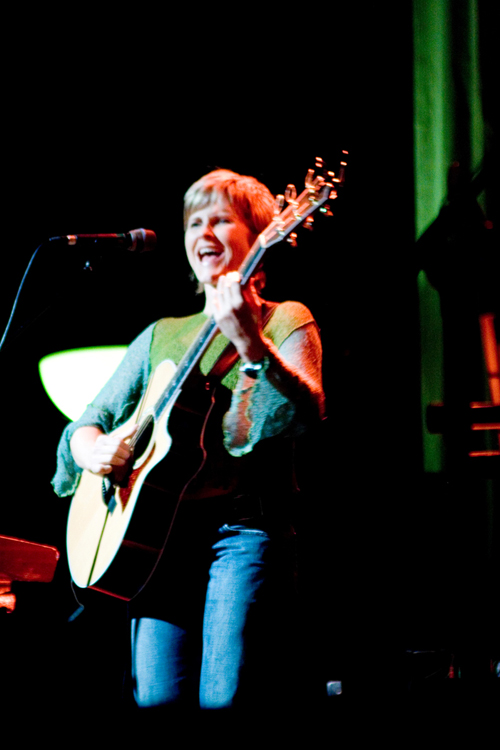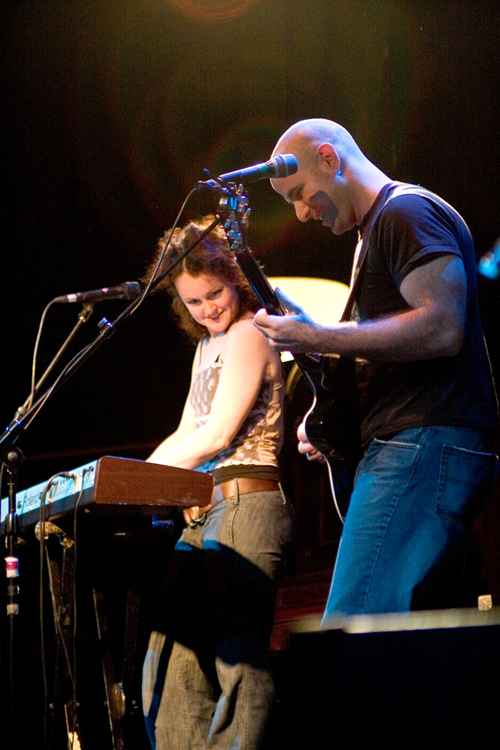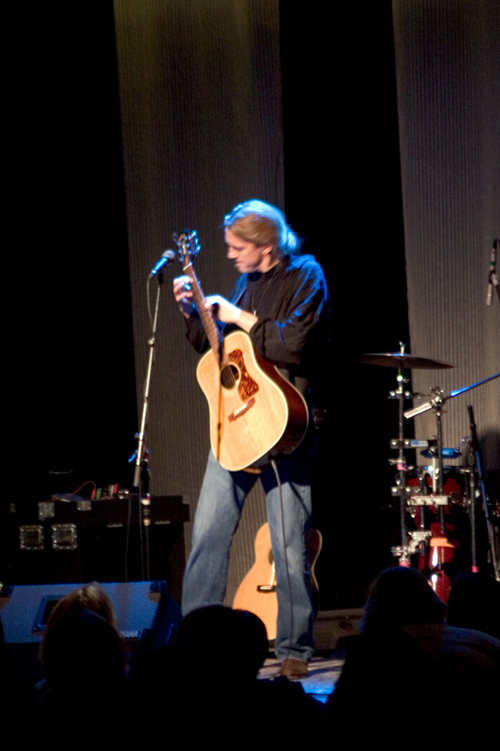Peppermint: Varied Local Flavor
Sally McGraw went to Peppermint Records' showcase on Nov. 20 and has a few bones to pick with the label.




When David Weeks and Andy Carlson founded Peppermint in 1997, they sought to create something more organic than another efficient-but-impersonal promotional machine. Their idea was to foster a sense of community among the musicians on their roster, and, in doing so, to create crossover between the core audiences each artist individually drew. They hand-picked artists with unique styles but similar musical sensibilities to further this aim. Now, seven years later, Carlson has been replaced by Eric Tell; the Peppermint family consists of thirteen independent artists including Stuart Davis, Brenda Weiler, and Alva Star; and the company has opted to cast their net a little wider than the Midwest for new recruits. But the core idea remains the same: if you like one Peppermint artist, you’ll probably dig the others.
This tenet is the driving force behind the Peppermint Sampler CD, a sporadically released compilation of roster artists’ previously released album tracks. It is also the motive for the Peppermint Presents artist showcase series, the third of which took place at the Cedar Cultural Center on Saturday, November 20, and featured Ellis, Billy McLaughlin, Anne Heaton, and Erika Luckett.
It was bitterly cold night, but the atmosphere inside the Cedar was relaxed and warm as a mostly female audience ambled into the performance space to claim their folding chairs. The house was about three-quarters full when David Weeks hopped onstage to introduce the event, plugging the tee-shirts and sampler CDs Peppermint was selling to the right of the stage. Weeks seemed ill-at-ease, and although he mentioned that there would be a “special treat” at the end of the show when Billy McLaughlin and his quartet took the stage, he failed to introduce – or even mention – any of the other artists slated to perform that night.
And so Erika Luckett clomped onto the low-rise Cedar stage in impressive black platform boots and a gauzy blue top with no intro and only a smattering of applause. She looked a bit like Shawn Colvin, but the deep, smoky alto that came pouring from her mouth cut that comparison short. Luckett’s opening number was in Spanish, a Latin-influenced guitar line with hints of Cante Jondo in the vocals. Born in Mexico and raised in Brazil and Venezuela, she is known for mixing styles, languages, and techniques from around the globe into her composition and performance. Her set also included funk-influenced grooves, anthemic rockers, lighthearted story-songs, and mournful waltzes. These disparate compositions hung together loosely, with little more than Luckett’s throaty, passionate delivery to unite them.
Luckett is clearly an accomplished guitarist, opening her set with a few polyrhythmic fingerwork flourishes and consistently drawing rich, clear strummed tones from her custom 514ce. She is also an animated performer, with a fantastic range of facial expression and an irrepressible desire to move her body to her own music. But despite her passion and skill, Luckett’s banter and songwriting style gave off a distinctly affected vibe. She introduced “Evangelina” – an upbeat, rolling Latin number about a woman working as a parking lot attendant – with an interminable and clearly rehearsed story about the story’s human inspiration, whom she actually described as having “eyes the color of coconut shells.” She reeled off the various countries from which Evangelina might have hailed, and attempted to take on the native accents of each. “Deepest Deep,” a song she described as being “French-influenced,” was sung partially in French. By this time it appeared that she’d made her status as a foreign-born polyglot a gimmick – an easy way to set herself and her songs apart. Perhaps someday she’ll settle into a sense of self that is more consistent, and her core talent will shine through. But until then her repertoire is incongruent and her stage presence ingratiating.
Luckett also failed to mention the next performer before taking her leave, so Anne Heaton and her musical partner Frank Marotta Jr. clambered up and took their places unintroduced, too. The duo opened with “Take Your Desire,” a sparse but electrifying minor composition, Heaton thumping her keyboard and shaking her wild dark hair while Marotta wove spidery layers of guitar and keened out a harmony. They moved easily through their set, unleashing moody ballads and upbeat pop numbers with equal aplomb and punctuating most songs with endearing anecdotes and self-deprecating humor. Heaton introduced “Hey New York,” an adroit, fast-paced ramble, by describing her internal debate over moving back to her hometown of Chicago versus staying East. Her banter was easy and light, and although she frequently poked fun at her own idiosyncrasies, she did so with the confidence of someone who knows her flaws and is happy to laugh at them. Marotta wasn’t a big talker, nor was he nearly as animated as his partner, who swayed and stomped and crowed with fluid grace. But he kept listeners on their toes, transforming his electric guitar into a bass with an octave pedal and creating a platform for Heaton’s distinct timbre with solid backing vocals.
With a remarkably slow vibrato and pleasantly reedy tone, Heaton indulges in quirky vowels and unconventional placement of rhymes creating a truly unique musical experience. Her keyboard parts are mostly simple and rhythmic, but well-supported by Marotta’s contributions, and together they create a remarkably full sound for a two-instrument outfit. Her songs are atmospheric, well-crafted pop gems with intriguing melodies and infectious hooks. Evocative lyrics like, “I fell in love with a woman today and it made me feel so ugly / ‘cause we’re the same except she’s so much better … She cuts to my heart like no man could ever do / ‘cause she knows I’m not a victim” (from “Black Notebook”) prove Heaton a thoughtful lyricist with a healthy respect for her craft.
But her sense of humor lurks always just beneath the surface. In her closing number – another semi-spoken semi-sung musical tale that she composed as a maid-of-honor toast for her best friend’s wedding – she coaxed giggles out of an otherwise-inhibited audience and endeared herself to all before sauntering offstage.
David Weeks took the mic to inform us all of a 10 to 15-minute intermission, and as the performers dealt with swapping gear, the audience dispersed. Nearly 35 minutes later, the natives were getting restless. Ellis, clearly unsure of what (if any) plan was being utilized, got onstage and started tinkering with her guitar tuner. When the spot came on and Weeks gave her a startled shrug, she decided to take the reins.
Ellis was clearly the performer that the majority of this audience had come to see, as evidenced by the hoots, whistles, and loud applause that greeted her. Sporting a longish pixie-cut and fitted black tee shirt, she was the first and only musician who had the courtesy to introduce herself. Ellis began her set with “Angel,” a minimal, plaintive ballad that dates back to her Bobby Llama days. She offered the song to the audience with earnest passion, rocking and swaying to the circular rhythm wearing her trademark blissed-out smile. While introducing her next tune, she broke into frequent infectious giggles and bashful smiles. Her magical combination of charisma and sincerity had the audience eating out of her hand in no time.
Her set included a few humorous songs such as “Georgeanne,” the story of a woman who appears to continually give out Ellis’ phone number by mistake, causing a stream of wrong number calls and highly revealing phone messages. But she doled out a healthy helping of vulnerability with the finger-picked, folky ballad “Begin Again,” a wounded message to a long-lost friend, full of candor and forgiveness. Each song was introduced with nervous laughter and frenetic banter, but sung with the open-hearted authenticity with which it had been crafted.
Ellis has a voice that can only be described as pure. Her tone and pitch are even and clean; she reserves her vibrato for special occasions; and the strength of her sound is in its simplicity. Her guitar playing consists mainly of unimaginative strumming, and her Guild acoustic creates a sound that is surprisingly characterless. But her playing is passable and clearly secondary to her singing and songcraft. Her stage presence is captivating, and she is, overall, a courteous and professional performer – introducing each song by name and always looking her audience squarely in the eye.
Unfortunately, during her closing number, Ellis forgot her lyrics and had to begin again. The audience was forgiving, but it seemed ironic that a song about coping with anxiety, “Tigers Above, Tigers Below,” should trip her up. A weak ending to an otherwise strong set.
Before taking her leave, Ellis gave a warm and enthusiastic introduction for Billy McLaughlin. The tall, lanky, cowboy-booted guitarist mounted the stage and took a slightly melodramatic bow amid tepid and fading applause. A 15-year performance veteran with five Minnesota Music Awards under his belt, McLaughlin is renowned for his innovative acoustic work. His first number – a circular melody comprised of intricate hammer-ons layered over a plodding pull-off bass line – was complex and showy but soulless. He played this song with his fretboard on the right, the opposite of how a guitar is traditionally played by right-handed musicians. This merely added another layer of ostentation (as McLaughlin is, indeed, a righty), and combined with his stiff, preening stage banter made him instantly unappealing.
He brought percussionist Bill Oehrlein onstage for his second number, another fingerstyle piece which turned out to be “God Rest Ye Merry Gentlemen.” More rigid hammer-ons and pull-offs mixed with shakers, bells, and rims in a slow-but-intriguing arrangement. McLaughlin flubbed a few notes, but forged ahead.
After his second tune, McLaughlin asked his quartet, Simple Gifts, to join him for the remainder of the set. Vocalist Carin Vagle and Celtic whistle player Jeni-Lyn Starr slunk self-consciously onstage and the group launched into a rendition of “O Come, O Come, Emmanuel.” It soon became clear that the “special treat” promised many hours ago by Weeks was this: a bunch of retooled Christmas carols! And in the middle of November no less! (Audience members toward the back of the room expressed their holiday joy by fleeing to the lobby.)
The group plowed gamely through “I Saw Three Ships” and “Angels We Have Heard on High” despite malfunctioning mics and a blast of ear-splitting feedback. This group either needed to rehearse for a few more hours, or learn to do a proper sound check. Vagle’s strong, clear vocals seemed to float effortlessly from her, but she looked awkward and deeply uncomfortable onstage. Starr also seemed restless and uneasy, adding to the slapdash, unprofessional feel of the group.
Simple Gifts had a few things going for them, and even managed to create a moment or two of musical enjoyment. McLaughlin’s flashy solo playing took backseat to lively, complex arrangements that gave the occasional spark of new life to undeniably overplayed carols. A few arrangements included tight three-part harmonies from Vagle, McLaughlin, and Oehrlein, who blend well and create a strong, full sound. But overall, this was a sloppy set of unwelcome holiday songs from a group of musicians who aren’t even close to being ready for primetime.
After the quartet left the stage, there were a few expectant moments when Weeks (or someone from Peppermint) might’ve taken the opportunity to thank the audience or plug their wares again. But – in the same amateurish vein as the rest of the evening – those moments passed, the lights went up, and we all pushed out into the freezing night.
Aside from the overall disorganization and unprofessionalism rampant at this event, the grouping of artists seemed inexpert and perplexing. Did Peppermint really think that fans of earnest, folky Ellis would sit through Billy McLaughlin’s fancy display of Christmasy fingerwork? That fans of Erika Luckett’s world-music-in-a-blender approach would enjoy Anne Heaton’s brainy pop is a slightly smaller leap to take … but it’s still a leap. Perhaps Peppermint was truly trying to push listener boundaries, and perhaps there were audience members open-eared enough to enjoy all four contrasting styles presented in this showcase. But a more likely explanation is that the less successful of these artists needed a boost from the thriving, established ones. A more congruent group could’ve been pulled from the Peppermint roster quite easily, but it wasn’t. And in the end, this show may have had the opposite effect intended: instead of creating audience overlap, it likely created audience distrust.
Photos by Michael McGraw